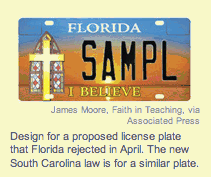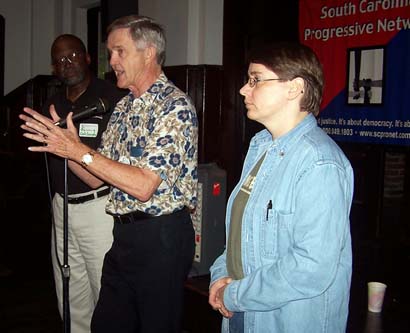Voting Rights Remain Unclear for SC Citizens Who Have Served Their Sentences
In light of a recent study that revealed confusion among county election directors regarding procedures for ex-offenders’ voting rights, the State Election Commission (SEC) yesterday sent a memorandum to the 46 county election directors advising them that they “may ask the voter for proof of completion of their sentence, but this is not required by law.”
This discretionary additional requirement may depress the vote among ex-offenders, said Brett Bursey, director of the SC Progressive Network. “If additional proof is not required by law, the State Election Commission should be advising the counties not to require proof that an offender has completed a sentence. This added requirement burdens the 18,000 citizens a year who have paid their debt to society, and may result in them not voting.”
South Carolina’s voter registration form includes a “Voter Declaration” that the registrant must sign, and face criminal penalties for falsely taking the oath. No additional proof is required to prove their US citizenship or mental competency. Ten counties accept the oath as proof that the registrant is not serving a criminal sentence.
On Sept. 17, the SC Progressive Network and the SC ACLU held a press conference to release the results of a study that found county election directors around the state had different methods of dealing with ex-offenders who wanted to register to vote. The study concluded that, since there were no laws regulating the procedure, all counties should simply allow ex-offenders to register by signing the registration form.
“We daily encounter citizens who tell us they can’t vote because they are ex-offenders.” Bursey said. “Unfortunately, the citizens don’t know the laws, the county election boards don’t know the laws, and the State Election Commission is unwilling to define the laws.”
While the SEC has recognized that there is no law requiring ex-offenders to provide proof of completion of sentence to register, its officials claim they are unable to direct the independent county election boards not to do so.
When asked if they will issue a press release advising ex-offenders of their right to register, an SEC spokesperson said, “That’s not our job.”
Sept. 24 SC Election Commission memorandum:
Any person who is convicted of a felony or an offense against the election laws is not qualified to register or to vote, unless the disqualification has been removed by service of the sentence, unless sooner pardoned. Service of sentence includes completion of any prison/jail time, probation, parole, and payment of restitution.
Federal and state courts provide the SEC with lists of persons convicted of felonies or crimes against the election laws. Those persons are removed from the state’s list of active, registered voters. The SEC notifies each voter whose name is deleted from the list. Voters have 20 days from the date the notice is mailed to appeal. Appeals must be made to the SEC.
Once a person who was convicted of a felony or offense against the election laws serves their sentence; they may register or re-register.
The following process should be followed for voters who are re-registering after being made inactive due to a conviction.
• The voter must re-register with the county voter registration board by submitting a voter registration application.
• The board makes the final determination of whether the voter meets the qualifications to register.
• The board may ask the voter for proof of completion of their sentence, but this is not required by law.
• The voter is either added as a new voter or reinstated to the voter registration system
• If the board determines a voter should be reinstated to active status, the board must notify the SEC in writing. Once notification is received, the SEC will reinstate the voter.Thank you,
Chris Whitmire
Public Information OfficerSouth Carolina State Election Commission
Post Office Box 5987
Columbia, S.C. 29250
Tel: 803.734.9070
Fax: 803.734.9366






